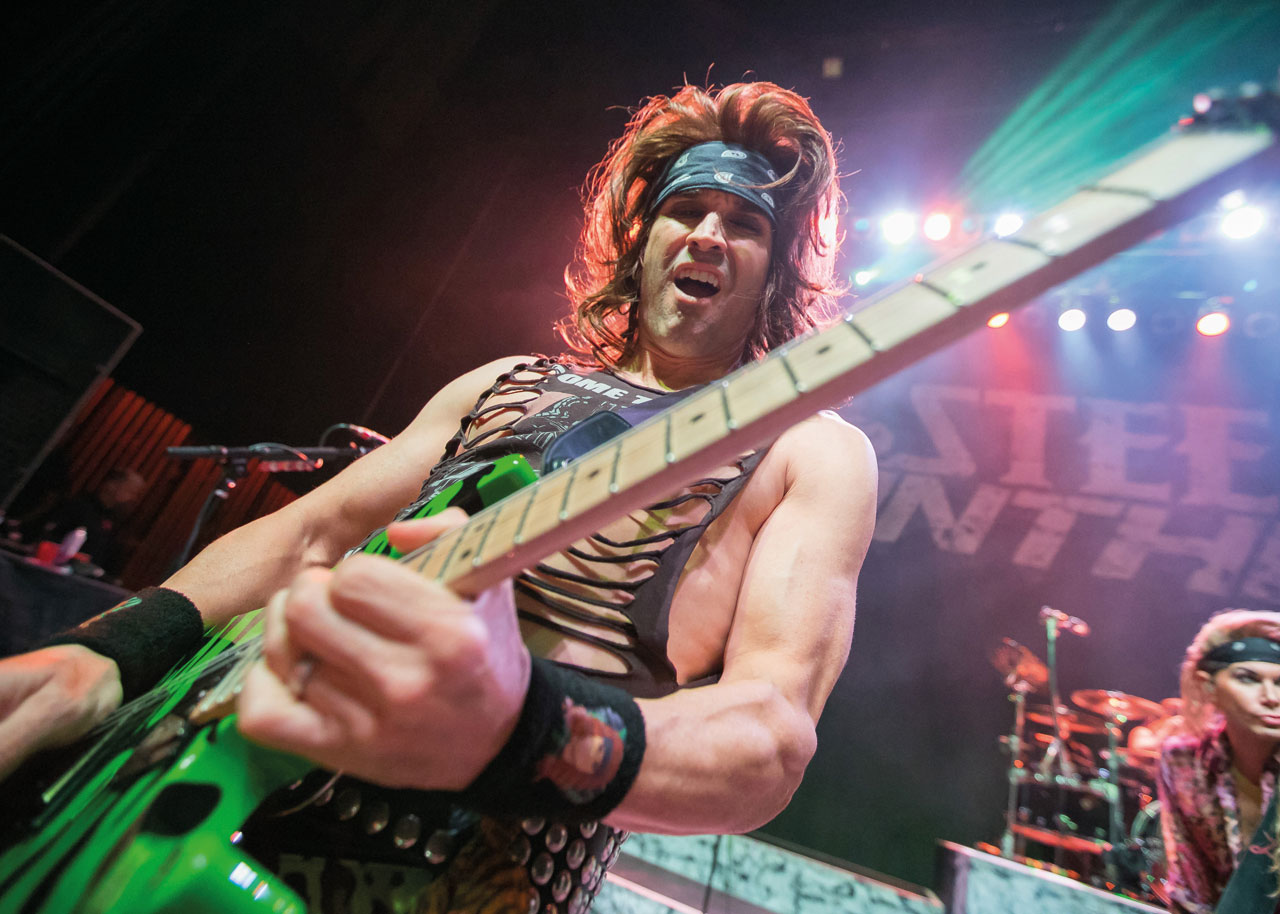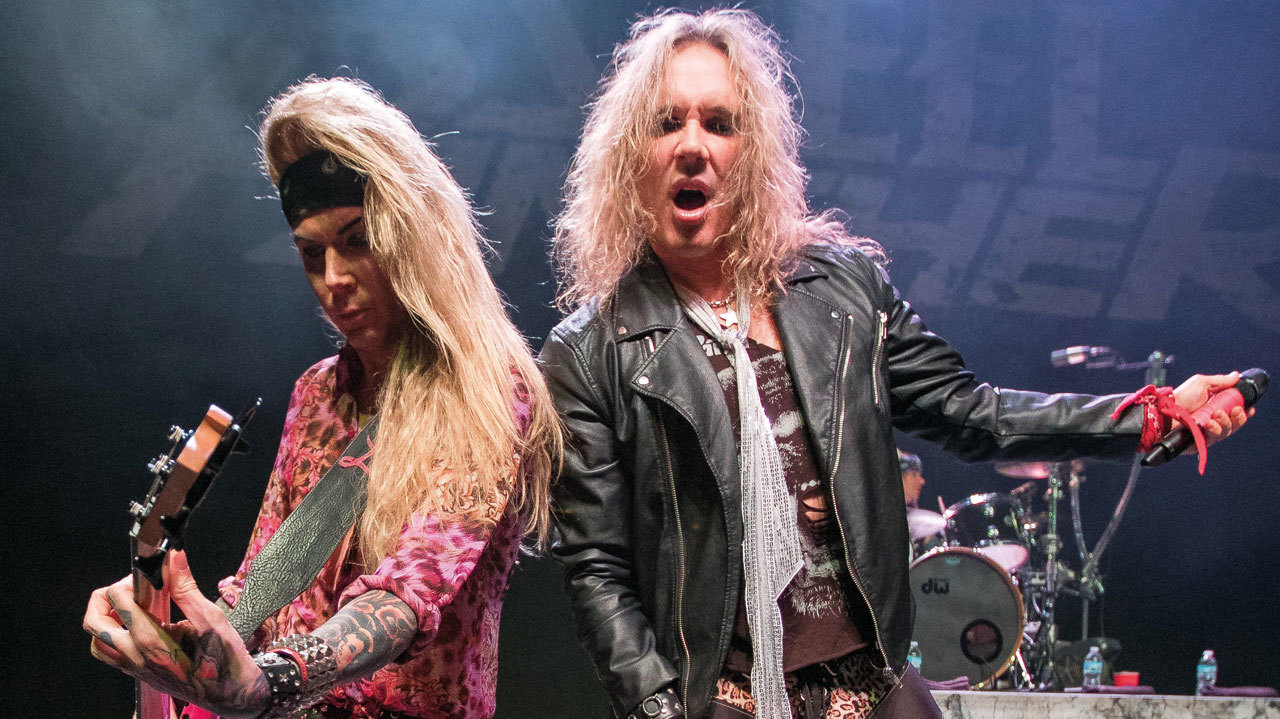Steel Panther are an enigma. Ostensibly a pastiche of 1980s glam metal, their huge success in the UK means they’re now every bit as big as the bands they’re paying pitch-perfect homage to. Their videos feature A-list comedians, they’ve sold out Wembley Arena twice in as many years, and they’ve not only graced the cover of this very magazine, but have hosted our annual Golden Gods awards twice. Plus, in an accelerated culture where bands often live or die on the basis of one album, they’re about to release their fourth. If Steel Panther are a joke, the laughter should have died out years ago. But instead, it just keeps growing. As the guys stretch out their sweatbands to prepare for the release of Lower The Bar, it’s time to shake off the spandex, drop the lipstick and get serious: just how the hell did this happen?
“I never, ever thought we would be playing Wembley, let alone selling it out. I never thought that would happen.” The man born Ralph Saenz, but more commonly known as Steel Panther frontman Michael Starr, is upfront about his surprise at the band’s stellar ascent from playing covers every Monday night on the Los Angeles club scene, and regardless of how seriously you take Steel Panther, or how seriously you think a band with a song called Bukkake Tears should take themselves, know this: they may earn their keep wearing spandex and singing about orgies in retirement homes, but Panther take the process behind the perversion very seriously indeed.
“All those shows we played: every Monday night, every Wednesday night in San Diego and every Friday and Saturday in Vegas, for 12 years straight – all that practice enabled us to work on our show and become the band we are today,” Michael insists.
It’s still quite a jump from The Roxy – capacity 500 – to packing 11,000 people into London’s legendary Wembley Arena. Twice. Are you sure that wasn’t always the plan?
“No!” replies Michael, emphatically. “There was no plan!”
Panther are notorious for doing press in character, and supposedly bristly about being challenged to give ‘real’ ‘answers. It’s a tongue-in-cheek heavy metal satire that we’re all in on, the unspoken agreement between the band and journalists being: don’t let the questions get too serious and we won’t have a problem. It’s a deal that works for both parties – Panther get friendly, wink-wink nudge-nudge coverage that purports to take their shtick at face value, and magazines like Hammer get features full of funny one-liners.
Which makes the uncharacteristic candour with which Michael talks about signing their record deal all the more surprising. Instead of launching into a well-prepared story about signing a contract with his ‘community property’, or celebrating with 17 girls in a row, he speaks of approaching success with a different perspective thanks to his age.
“This feels great. I love it – it’s everything I’ve ever dreamed of doing with my life,” he beams. “And I’m glad it happened when I was in my 40s, because I can appreciate it for what it is. It’s a big achievement, and we don’t take it for granted.”
Michael alternates between referring to Steel Panther’s “craft” and to their “product”. That might sound cynical, but the impression is that of someone who’s put serious consideration into what he – as a music fan – expects from his favourite bands and therefore what, as a performer, he should be aiming to provide.
“That’s how we developed our show – we interact with the audience and what comes from them is what dictates the show. Of course there’s a skeleton, and a setlist. We know we’re getting from A to B, but in between A and B is a bunch of fun. The only way fun can be natural and exciting is to interact with the audience – if it’s scripted out, it’s usually sterile. And it’s not fun.”
Michael probably uses the word ‘fun’ more than any other word when describing Steel Panther’s live show. He speaks critically of bands who “don’t take their craft seriously” and who are “winging it”. It’s important, when people are paying good money to watch your band, “to get a good, quality product out to them. Because I fuckin’ hate spending 80 bucks on a ticket and going to see some shitty band. That really pisses me off!” Being in a band is not just “getting up and rockin’,” he adds, “but it’s supposed to look that way.”
- Steel Panther: Michael Starr's Guide To Life
- Steel Panther, live at Wembley
- Steel Panther guitarist Satchel's top 5 hair metal guitar solos
- The Steel Panther Quiz
There’s an episode of South Park where Cartman fakes having Tourette’s as an excuse to say whatever he wants. So accustomed does he become to voicing every thought that crosses his mind, he loses his inner monologue and starts sharing his deepest secrets. Michael Starr appears to suffer from a similarly converse affliction: he’s so used to shoehorning jokes about drugs and hookers into his soundbites, he can’t help but do it even when he’s being sincere. It pops out during a discussion about the band’s fruitful relationship with Download festival, which has become a home away from home for the guys since they stole the show in the tent in 2009.
“It’s like when you buy cocaine,” Michael explains. “If you buy it from the same guy you always buy from, sometimes he’ll get shitty cocaine. But you still buy it. That’s loyalty.” He means what he’s saying, but the cocaine reference feels like a concession to Michael Starr, the character, rather than Ralph, the thoughtful musician. Still, his point about loyalty is genuine, and one that’s important to him. “That’s why we stay with Andy [Copping, Download and Live Nation promoter]. “He put his dick on the chopping block for us, took a chance. He’s fair, and he understands what we’re doing. We maintain our loyalty with people we work with, in all territories.”
The band’s Download debut in 2009 was the first moment where Steel Panther felt like they’d made it. “The tent was packed and people were holding up signs. They knew our music already.” It was, Michael says, “the most surreal thing we’d been through. We were like, ‘Did we make it? ’Cause if this is it, then this is fucking killer!’”
As the tents became main stages and the clubs became arenas, Steel Panther considered the audience experience every step of the way. An early lesson was that in an arena, it’s hard to interact with an audience you can’t see – “So now we know to have the crowd illuminated at certain parts of the show.” The acoustics of these huge venues also meant slowing down their mile-a-minute onstage banter. “If you want to say something that’s clever and funny and you don’t say it slow, in a big arena, no one can hear it.”
There are physical constraints to consider, too. “We had to learn how to work the stage properly and not overrun ourselves,” Michael reveals. “Once we got on that stage, [guitarist] Satchel and I were running up and down so much that by the third song we were done!” And of course, Michael says – somewhat surprisingly, given where conversations with him tend to go – “We’re not shooting heroin and doing blow every day. If we were doing that, there’s no way we’d be able to do our show!” Or worse: “We would end up looking like Vince Neil.”
A large part of Panther’s success is down to putting as much into the performance of their songs as they do into the writing of them. And one person’s joke is another’s blast from the past. “It’s nostalgic for some people, and something new for the younger generation,” Michael adds. Speaking to Panther fans – or ‘Fanthers’ – it becomes clear that it’s an effective strategy.
Ask the Fanthers themselves about the band’s appeal and you’re as likely to hear people in their 20s enthuse about the opportunity to experience a mythologised version of the 1980s metal scene, as you are middle-aged parents talk about reliving it. Younger fans might have been attracted by the novelty element – like a metal Lonely Island – but quality songwriting and incredible live shows have kept them coming back for more.

The segment of their fanbase who take Steel Panther more seriously are, you suspect, the reason for the band’s theatrical press appearances – the charade has to be just believable enough for the irony-challenged. Hence why, when asked about the PhD in English Literature that Wikipedia claims he has, Michael responds by claiming it’s not true but that it’s “gotten me a lot of different kind of pussy – and I’m not joking.” He almost certainly is. Surely it must get old, though, having to keep up the facade all the time?
“Being ‘on’ and being entertaining and funny – it is exhausting,” Michael admits. That being the case, just how much longer can Steel Panther continue? And it’s here, on this final query, that any question about whether the band are ‘serious musicians’ is shut down entirely as Michael references the biggest band in our world.
“Look at Metallica. You would think – before this last record – ‘How long is this going to go on for? What can they do differently?’ Then they put out a record that’s reminiscent of their old shit, but totally new. And they’ve evolved. You just never know.”
Could Steel Panther do that, though? If they showed up one day in checked shirts and jeans, and put out a grunge album, would their fans really see that as “evolution”?
“No, they would be pissed!” Michael laughs. So how does a band for whom evolution isn’t an option maintain its momentum?
“The one thing for musicians to stay alive is, you just have to stay together,” concludes the singer. “You have to continuously work on your craft. If you can grow as a human being – whatever that may be for anybody – it reflects in your music and people are drawn to it.”
Surprisingly thoughtful words from the man responsible for It Won’t Suck Itself. But while their lyrics are hilarious, their career is anything but a joke.
